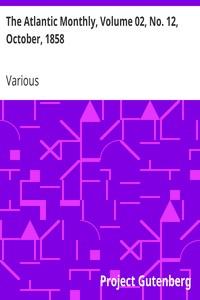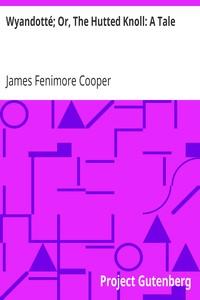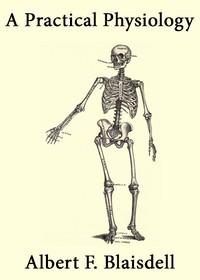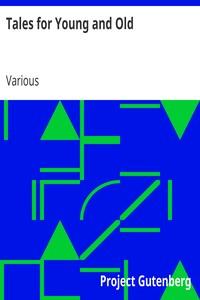|
|
Read this ebook for free! No credit card needed, absolutely nothing to pay.Words: 85744 in 21 pages
This is an ebook sharing website. You can read the uploaded ebooks for free here. No credit cards needed, nothing to pay. If you want to own a digital copy of the ebook, or want to read offline with your favorite ebook-reader, then you can choose to buy and download the ebook.

: The Atlantic Monthly Volume 02 No. 12 October 1858 A Magazine of Literature Art and Politics by Various - American periodicals The Atlantic Monthly@FreeBooksTue 06 Jun, 2023 THE ATLANTIC MONTHLY. A MAGAZINE OF LITERATURE, ART, AND POLITICS. THE NEW WORLD AND THE NEW MAN. The Old World, we say, seized upon this magnificent new force now thrown into history, and harnessed it unsuspiciously to its own car, as if it could have been designed for no other possible use. Happily, however, the design was different, and Providence having a peculiar faculty of protecting its own plans, the holding of the reins after such a steed proved anything but a sinecure. Spain, indeed, rode in a high chariot for a time, but at length, in that unlucky Armada drive, crashed against English oak on the ocean highways, and came off creaking and rickety,--grew thenceforth ever more unsteady,--finally, came utterly to the ground, with contusions, fractures, and much mishap,--and now the poor nation hobbles hypochondriacally upon crutches, all its brave charioteering sadly ended. England drove more considerately, but could not avoid fate; so in 1783 she, too, must let go the rein with some mental disturbance. For the great Destiny was not exclusively a European Providence,--had meditated the establishment of a fresh and independent human centre on the western side of the sea. The excellent citizens of London and Madrid found themselves incapable of crediting this until it was duly placarded in gunpowder print.--It is, indeed, an unaccountable foible men have, not to recognize a plain fact till it has been published in this blazing hieroglyphic. What were England and France doing at Sebastopol? Merely issuing a poster to this effect,--"Turkey is not yours,"--in a type that Russia could feel free to understand. Terribly costly editions these are, and in a type utterly hideous; but while nations refuse to see the fact in a more agreeable presentation, it may probably feel compelled to go into this ugly, but indubitable shape.--Well, somewhat less than a century since, England had committed herself to the proposition, that America was really a part or dependency of Europe, a lower-caste Europe, having about the same relation to the Cisatlantic continent that the farmer's barn has to his house. Mild refutations of this modest doctrine having been attempted without success, posters in the necessary red-letter type were issued at Concord, Bunker Hill, Yorktown, etc., which might be translated somewhat thus:--"America has its own independent root in the world's centre, its own independent destiny in the Providential thought." This important fact, having then and there exploded itself into legibility, and come to be known and read of all men, admits now of no dispute, and requires no confirmation. It is evidently so. The New World is not merely a newly-discovered hay-loft and dairy-stall for the Old, but is itself a proper household, of equal dignity with any. To draw the due inferences from this, to see what is implied in it, is all that we are here required to do. Thus had the great Genoese been destined merely to make a new highway on the ocean and new lines on the map,--to add the potato, maize, and tapioca to the known list of edibles, and tobacco to that of narcotics,--to explode Spain, give England a cotton-field, Ireland a hospital, and Africa a hell. This could by no means seem sufficient. The crew of the Pinta shouted, "Land! Land!"--peering through the dark at the new shores; the Spanish nation chanted, "Gold! Gold!"--gazing out through murky desires toward the wondrous West; but it is only with the cry of "Man! Man!" as at the sight of new cerebral shores and wealth of more than golden humanities, that the true America is discovered and announced. So whatever reason we have to assert for America a really independent existence and destiny, the same have we for predicting an opulence of heart and brain, to which Western prairies and Californian gold shall seem the natural appurtenance. Now, as Nature keeps up this inexhaustible variety of individual genius which individual quickening requires, so on the larger scale is she ever working and compounding to produce varieties of national genius. Her aim is the same in both cases,--to enrich the whole by this electrical and enlivening relation between its parts. And thus an American man, no copy, but an original, formed in unprecedented moulds, with his own unborrowed grandeur, his own piquancy and charm, is to be looked for,--is, indeed, even now to be seen,--on this shore. Yes, the man we seek is already found, his features rapidly becoming distinct. He is the offspring of Northern Europe; he occupies Central North-America. Other fresh forms are doubtless to appear, but, though dimly shaping themselves, are as yet inchoate. But the Anglo-American is an existing fact, to be spoken of without prognostication, save as this is implied in the recognition of tendencies established and unfolding into results. The Anglo-American may be considered the latest new-comer into this planet. Let us, then, a little celebrate his advent. Let us make all lawful and gentle inquiry about the distinguished stranger. Being thus satisfied upon the point of pedigree, we may proceed to inquire about estate. To what inheritance of land has Nature invited our New Man? He comes to the country of highest organization, perhaps, upon either hemisphere. Brazil and China suggest, but probably do not sustain, a rivalry. What is implied in superior organization will appear from the items to be mentioned. Rivers await their due celebration. We easily see that Nile, Ganges, Euphrates, Jordan, Tiber, Thames, are rivers of influence in human history, no less than water-currents on the earth's surface. They have borne barks and barges that the eye never saw. They have brought on their soft bosoms freight to the cities of the brain, as well as to Memphis, Rome, London. Some experience of their spiritual influence must have fallen to the lot of most men. The loved and lovely Merrimac no longer accedes to the writer's eye, but, as of old, glides securely seaward in his thought,--like a strain of masterly music long ago heard, and, when heard, identical in its suggestions with the total significance and vital progress of one's experience, that, intertwining itself as a twin thread with the shuttled fibre of life, it was woven into the same fabric, and became an inseparable part of the consciousness; so, hearken when one will, after the changes and accessions of many peopled years, and amid the thousand-footed trample of the mob of immediate impressions, still secure and predominant it is heard subtly sounding. Deep conversation with any river readily interprets to us that venerable mythus which connects Eden with the four rivers of the world; as if water must flow where man is chiefly blest. But the point here to be emphasized is, that rivers are the progressive and public element in its geographical expression. They throw the continent open; they are doors and windows, through which the nations look forth upon the world, and leave and enter their own household. They are the hospitality of the continent,--every river-mouth chanting out over the sea a perpetual, "Walk in," to all the world. Or again, they are geographical senses,--eyes, ears, and speech; for of these supreme mediators in the body, voice, vision, and hearing, it is the office, as of rivers, to open communication between the interior and exterior world; they are rivers of access to the outlying universe of men and things, which enters them, and approaches the soul through the freighted suggestions of sight and sound. Rivers, lastly, are the geographical symbol of public spirit, the flowing and connecting element, suggesting common interests and large systems of action. Accordingly, in our American Man must be found, first, social largeness and susceptibility,--whatsoever, in the breadth of a flexile and sympathetic nature, may contribute to the keeping of the Golden Rule. But the broadest good-feeling will not alone suffice. The great pledge of peace, fellowship, and profitable co-working among such a population as we anticipate must be sought in the deeper unity of moral principle. For Right is one, and is every man's interest. Right is better than Charity; for Right meets, or even anticipates, normal wants, while Charity only mends failures. Nothing, therefore, that we could discover in the New Man would be such a security for his future, nothing so fit him for his place, as a tendency to simple and universal principles of action. In the absence of this, he will infallibly be compelled one day to enter Providence's court of chancery, and come forth bankrupt. But let him be, even by promise, a seer of those primary truths in which the interests of all are comprehended and made identical, and the virtue of his vision will become the assurance of his welfare. Doubtless, sad men will say that our own eyes are clouded with some glittering dust of optimism, when we declare that this Man for the Continent is the very one whose advent we celebrate. This might, indeed, seem a fatuitously dulcet song to sing just now, when a din of defection and recreancy is loud through all the land,--now, when we have immediately in view, and on the largest scale, an open patronage of infamous wrong-doing, so brazen-fronted and blush-proof that only the spectacle itself makes its credibility;--the prior possibility of it we should one and all hasten, for the honor of human nature, to deny. Yet in the midst of all this are visible the victorious influences that mould the imported Teuton to the spiritual form which his appointed tasks imply. These we now hasten to indicate. Mr. Robert Knox, of England, somewhat known as an ethnological lecturer and author,--a thinker in a sort, though of the "slam-bang" school, of far more force than faculty, and of a singular avidity for ugly news,--dogmatically proclaims that all Americans are undergoing a physical degeneration, involving, as he thinks, an equal lapse of mental power, proceeding with swift fated steps, and sure ere long to land them in sheer impotence and imbecility; and he appeals to the common loss of adipose tissue and avoirdupois as proof. This author belongs to a class of well-meaning gentlemen, so unfortunately constituted that the distractions of their time induce in them an acetous fermentation ; and from acid becoming acrid, they at length fall fairly in love with the Erinnyes, and henceforth dote upon destruction and ugliness as happier lovers do upon cosmical health and beauty. Concluding that the universe is a shabby affair, they like to make it out shabbier still,--and so, seldom brighten up till they have an ill thing to say. They are not persons toward whom it is easy to feel amiable. Dogmatism is ever unlovely, though it be in behalf of the sweetest hopes; but chronic doubt and disbelief erected into a dogmatism are intolerable. Yet Mr. Knox's misinterpretations of the facts are taking root in many minds that do not share his fierce hypochondria and hunger for bitter herbs. That the American has lost somewhat in animal resources is incontestable; but Mr. Knox's ever-implied premise, "The animal is the man," from which his Jeremiad derives its plaint, is but a provincial paper-currency, of very local estimation, and can never, like gold and silver, pass by weight in the world's marts of thought. The physical constitution of the New Man is comparatively delicate and fragile; but as a china vase is not necessarily less sound than a stone jug or iron kettle, so delicacy and fragility in man are no proof of disease. The ominous prognosis of this doctor, therefore, seems no occasion for despair, perhaps not even for alarm. But to perceive what different harping can be performed on this string, hear Carus:--"Leanness, as such," says the master, "is the symbol of a certain lightness, activity, rapidity, and mental power." Thus the adipose impoverishment, which to the yellow-eyed Englishman seems utter bankruptcy, is at once recognized by a superior man as denoting an augmentation, rather than diminution, of proper human wealth. Free books android app tbrJar TBR JAR Read Free books online gutenberg More posts by @FreeBooks
: Wyandotté; Or The Hutted Knoll: A Tale by Cooper James Fenimore - Historical fiction; War stories; New York (State) History Revolution 1775-1783 Fiction; Tuscarora Indians Fiction; Otsego County (N.Y.) Fiction@FreeBooksTue 06 Jun, 2023

: A Flock of Girls and Boys by Perry Nora Parker Charlotte Tiffany Illustrator - Conduct of life Juvenile fiction; Children's stories; Youth Conduct of life Juvenile fiction@FreeBooksTue 06 Jun, 2023
|
Terms of Use Stock Market News! © gutenberg.org.in2025 All Rights reserved.






